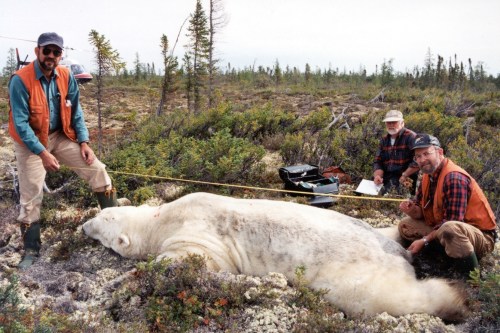Last week’s media coverage made me realize that James Hansen’s testimony to a US Senate committee in 1988 provided well-timed answer to a vexatious problem facing polar bear biologist Ian Stirling. Thirty years ago, Stirling was struggling to understand why polar bear productivity in Western Hudson Bay had dropped. He was ripe for the suggestion from Hansen (and his follow-up paper) that human-caused global warming could be the explanation. An interview with Stirling and colleague Andrew Derocher published in 2016 helps connect the dots.
Many bears were in poor condition in the fall of 1983 (Calvert et al. 1986:19, 24; Ramsay and Stirling 1988). In general, the 1980s saw weights of bears decline and cub mortality increase, with a marked increase in the loss of whole litters over what had been documented in the 1960s and 1970s (Derocher and Stirling 1992, 1995).
Until Hansen and climate change came along, density-dependent effects (such as the number of bears out-pacing food supply) were seen as the most likely explanation. But sea ice decline blamed on human-caused global warming was suddenly a new possibility that Stirling soon embraced (Stirling and Derocher 1993). By the late 1990s, sea ice coverage on Hudson Bay had indeed declined but the correlation with polar bear productivity produced a weak trend that was not statistically significant (Stirling et al. 1999).
The 1999 Stirling paper did not provide scientific evidence to explain the 1980s decline in productivity as much as it presented a novel scapegoat to blame when a more plausible explanation could not be made.
Bottom line: Global warming could not have been the proximate cause of the productivity changes in WH polar bears documented during the 1980s but Stirling spent the next two and a half decades vigorously pushing climate change as the cause of all polar bear ills. Continue reading






You must be logged in to post a comment.